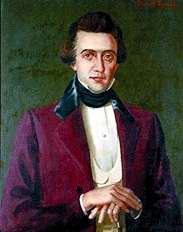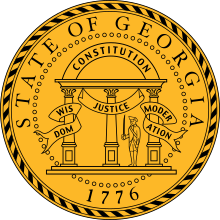George W. Towns
George Washington Bonaparte Towns (May 4, 1801 – July 15, 1854) was a United States lawyer, legislator, and politician. He was a U.S. Representative, and the 39th Governor of Georgia from 1847 to 1851.
George Washington Bonaparte Towns | |
|---|---|
 | |
| 39th Governor of Georgia | |
| In office November 3, 1847 – November 5, 1851 | |
| Preceded by | George W. Crawford |
| Succeeded by | Howell Cobb |
| Member of the U.S. House of Representatives from Georgia's at-large congressional district | |
| In office March 4, 1835 – September 1, 1836 | |
| Preceded by | Augustin S. Clayton |
| Succeeded by | Julius C. Alford |
| In office March 4, 1837 – March 4, 1839 | |
| Preceded by | Julius C. Alford |
| Succeeded by | Thomas B. King |
| Member of the U.S. House of Representatives from Georgia's 3rd congressional district | |
| In office January 5, 1846 – March 4, 1847 | |
| Preceded by | Vacant (Initial Rep-Elect Washington Poe never took office) |
| Succeeded by | John W. Jones |
| Personal details | |
| Born | May 4, 1801 Wilkes County, Georgia, U.S. |
| Died | July 15, 1854 (aged 53) Macon, Georgia, U.S. |
Biography
Towns was born in Wilkes County, Georgia to Margaret George Hardwick and John Towns in 1801. His parents were Virginians who had moved to Georgia and settled in Wilkes County.
Shortly after his birth, the Towns family moved throughout Georgia, where he received a small preparatory education. He then began to study medicine in Eatonton, but after his studies were interrupted by an injury, he moved to Montgomery, Alabama, which had recently joined the Union. There, he studied law and, in 1824 was admitted to the Montgomery bar.
As time went by, Towns continued to gain prominence and in 1826 acquired the Alabama Journal newspaper. During that same year he married his first wife, Margaret Jane Campbell, whose poor health led to her death several days after the marriage ceremony. Following the death of his wife, Towns moved back to Georgia and settled in Talbot County.
Career
In 1828, Towns became one of the original town commissioners of Talbotton, where he also established a law office. During this period Towns served as colonel in the 65th Regiment of the Georgia Militia.
Towns began his 22-year-long political career in 1829 as a strong Unionist and opponent of nullification in the Georgia House of Representatives and Georgia Senate. He subsequently served as a U.S. Representative, and the 39th Governor of Georgia from 1847 to 1851.[1] On September 23, 1850, Towns asked the General Assembly to allow a special election to send delegates to a state convention to pass judgment on the Compromise of 1850.[2]
By the end of his time in politics, Towns had become a radical secessionist who believed the federal government was controlled by abolitionists bent on repressing the South.
Death and Legacy
Towns died in Macon, Georgia on July 15, 1854, and is interred at the Rose Hill Cemetery in that town.
Towns County, Georgia is named in his honor.[3]
References
- "Towns, George Washington Bonaparte, (1801 - 1854)". Biographical Directory of the United States Congress. Retrieved September 4, 2012.
- Huston, James L. (December 2000). ""Southerners against secession: the arguments of the constitutional unionists in 1850-51". Civil War History. 46 (4): 284. doi:10.1353/cwh.2000.0007.
- Krakow, Kenneth K. (1975). Georgia Place-Names: Their History and Origins (PDF). Macon, GA: Winship Press. p. 230. ISBN 0-915430-00-2.
External links
- United States Congress. "George W. Towns (id: T000327)". Biographical Directory of the United States Congress.
- George W. Towns at Find a Grave
| Party political offices | ||
|---|---|---|
| Preceded by Matthew Hall McAllister |
Democratic nominee for Governor of Georgia 1847, 1849 |
Vacant Title next held by Herschel Vespasian Johnson |
| U.S. House of Representatives | ||
| Preceded by Augustin Smith Clayton |
Member of the U.S. House of Representatives from Georgia's at-large congressional district March 4, 1835 – September 1, 1836 |
Succeeded by Julius Caesar Alford |
| Preceded by Julius Caesar Alford |
Member of the U.S. House of Representatives from Georgia's at-large congressional district March 4, 1837 – March 3, 1839 |
Succeeded by Thomas Butler King |
| Preceded by At Large districts |
Member of the U.S. House of Representatives from Georgia's 3rd congressional district January 5, 1846 – March 3, 1847 |
Succeeded by John William Jones |
| Political offices | ||
| Preceded by George W. Crawford |
Governor of Georgia 1847–1851 |
Succeeded by Howell Cobb |

